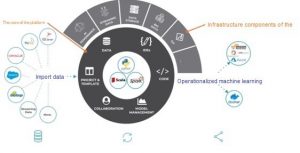As data volume increases, many organizations must analyze their big data in more detail in order to identify problems, set goals, and take preventive measures, so they can be more efficient, reduce costs, and reduce risks. The need for a platform that applies (AI) to the storage layer and parallelizes big data processing is essential in this area, and these intelligent methods may be used to perform predictive, prescriptive, and descriptive analyses.
Our platform provides an integrated software infrastructure for automating (ML) cycles. By accelerating the development, deployment, and management of operational-scale AI applications, experts can spend less time planning infrastructure and more time delivering better, more accurate, and smarter solutions.
Technical characteristics of our (AI) platform
our AI platform allows businesses to easily design, deploy and share predictive analytics solutions. By using this product, you can reach the establishment of a machine learning model with a few clicks from the idea; Models that work on any type of data, at any size. The platform manages the entire data analytics lifecycle, from accessing and processing raw data to extracting value from it, ensuring best practices are applied consistently. This function increases the productivity of the data science team and increases the organization’s (AI) capacity by empowering business analysts in organizations.
Advantages of using (AI) platform
- Using proven (ML) solutions
- Fast and easy creation of (ML) models
- Deployment of (ML) models as a service
- High scalability and computing performance
- Having tools for data preprocessing and visualization
- Ease of integration with other infrastructure services including cloud storage
- There is no need to manage any infrastructure
Key features of the AI platform
- The possibility of deployment on different environments: The possibility of deploying the (AI) platform on public cloud, private cloud (within the organization) or common infrastructure in organizations so that by using our (AI) as a managed service, organizations do not need to buy special hardware, software or get involved in issues related to deployment or maintenance.
- Scalability and efficiency: The ability to create, test, and apply numerous (ML) models that are scalable with the volume, speed, and levels of automation required by large organizations.
- Life cycle management of (ML) models: Management of data import processes, data analysis and preprocessing, model creation, model evaluation, model deployment as a web service and model monitoring.
- Ability to analyze and process all types of data: Analysis of all types of structured, semi-structured or unstructured data and support for all types of databases.
- Data visualization: Providing a variety of output display models and analysis such as histogram, graph and map.
- Integration: The ability to connect to a variety of data sources, data warehouses, visualization and reporting tools through the provision of standard APIs and a diverse set of protocols.
- Security: Role-based access control, integrated authentication (SSO) based on OAuth 2.0, auditing of all platform operations and data encryption.
- Automatic configuration and scaling: Allocating resources between different parts of the platform and automatically managing storage and computing resources based on operational complexity and management costs.
- Interactive analysis: Question and answer capability via NLP techniques (chatbot).
- Support for various data import methods: Such as continuous flow of data (Streaming), batch operations (ETL), and API calls.








